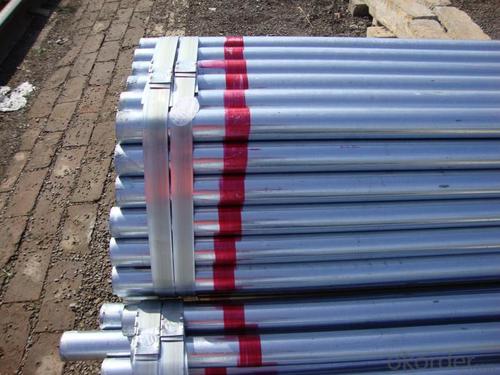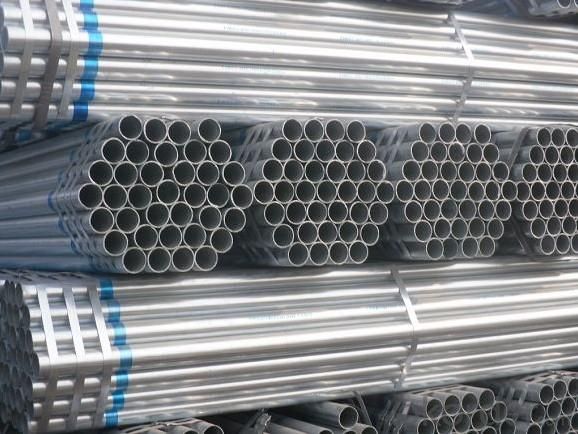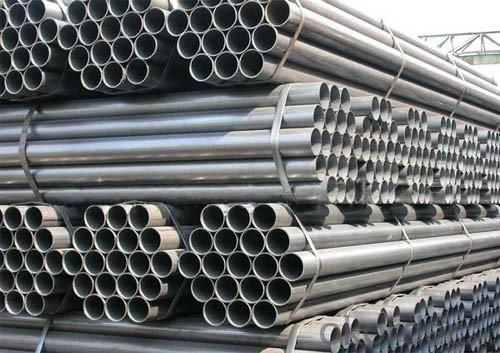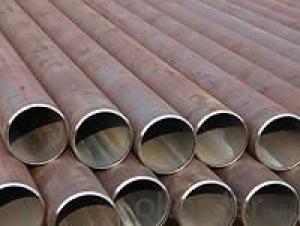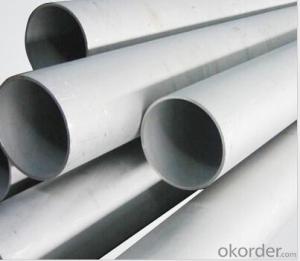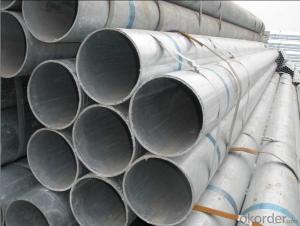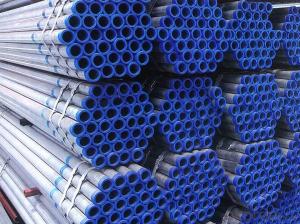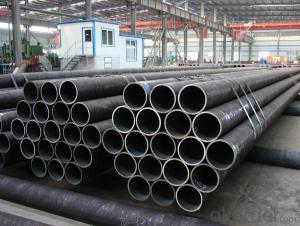Galvanized Oiled Painted Bare Welded Scaffolding Building Structure Pipe ASTM A53,GB/T3091,BS1387
- Loading Port:
- Tianjin; Qingdao Port
- Payment Terms:
- TT or LC
- Min Order Qty:
- 50MT m.t.
- Supply Capability:
- 5000 Tons Per Month m.t./month
OKorder Service Pledge
OKorder Financial Service
You Might Also Like
1.Specification of Scaffolding Building Structure Pipe
1)Application: For low pressure liquid delivery such as water, gas and oil; For construction, e building greenhouse. Structure,Machinery,Airport,Railway,Building, Construction ect.
2)Standard: BS1139, EN39, EN10219, GB/T13793, JIS G3444, ASTM A53,GB/T3091,BS1387
3)Other Material: Q195,Q215,Q235,Q345
4)Surface Treatment: galvanized , oiled, painted , bare
5)End Treatment: beveled , plain , threaded
5)Test: Chemical Component Analysis, Mechanical Properties (Ultimate tensile strength, Yield strength, Elongation), Technical Properties (Flattening Test, Bending Test, Blow Test, Impact Test), Exterior Size Inspection, Hydrostatic Test, X-ray Test.
7)Application: fence, construction.
8)Certificate: SGS, BV, Lloyds etc.
2.Size of Product
Outer Diameter: 27mm, 38mm, 42mm, 48.3-48.6mm
Thickness: 2.5mm, 2.75mm, 3.0mm, 3.25mm, 3.5mm, 3.75mm, 4.0mm
Length: 5.8m, 6.0m, 6.4m, 6.5m,0.3-18m3.
3.Packing&Delivery
Packing Detail: Big OD: in bulk; Small OD: packed by steel strips; Water-proof cloth ; According to Customer's requirement
Delivery Time: Usually in 20-30 days after receving the deposit or the LC
4. Data Sheet
Chemical Composition of Raw Materials | Mechanical Property of Raw Materials | ||||||||||
Item | Chemical Composition % | Item | Mechanical Property | ||||||||
Steel | Steel No. | C | Mn | S | P | Si | Al | Steel | Yield Point Mpa min | Tensile Strength Mpa | Elongat on % min |
S235GT | 1.0106 | < 0.20 | < 1.40 | < 0.045 | < 0.040 | < 0.05 | > 0.020 | S235GT | 235 | 340--520 | 24 |
5. Standard Size for Reference
OD (mm) | WT (mm) | L (mm) | Tolerance (min) mm | Zinc Coating g/m2 |
48 -- 48.6 | 2--7 | 300 -- 6000 | WT +/- 0.2 , L - 0 -- + 3 | 280--400 |
other size also can be manufactured, please contact us for detail information. | ||||
6. Products Showroom
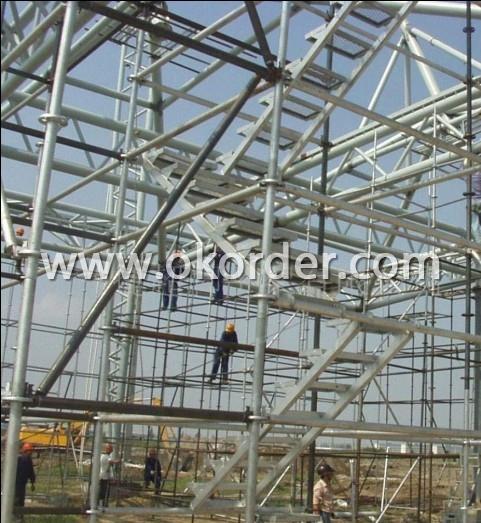
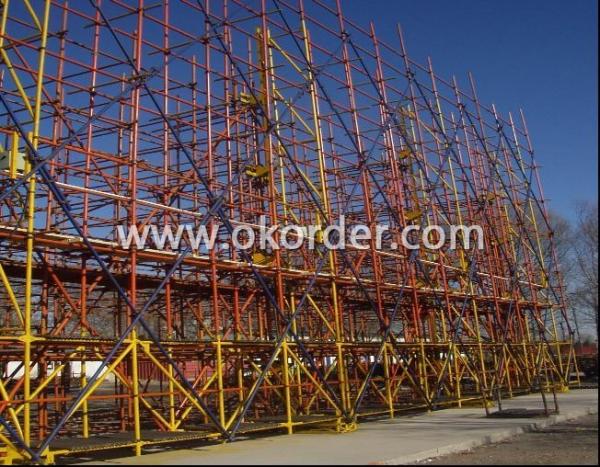
- Q: Can steel pipes be used for airport construction?
- Yes, steel pipes can be used for airport construction. Steel pipes are commonly used in various construction projects due to their durability, strength, and resistance to corrosion. They are capable of withstanding heavy loads and are often used for underground drainage systems, water supply networks, and structural support in airport construction.
- Q: What are the different methods of repairing damaged steel pipes?
- There are several methods for repairing damaged steel pipes, including welding, pipe lining, pipe bursting, and pipe patching. Welding involves cutting out the damaged section and replacing it with a new piece of pipe, which is then welded into place. Pipe lining is a method where a new pipe is inserted into the damaged one, creating a seamless and corrosion-resistant inner lining. Pipe bursting involves fracturing the damaged pipe while simultaneously pulling a new pipe through the old one, effectively replacing it. Pipe patching is a temporary fix that involves applying a patch over the damaged area using epoxy or other materials. The choice of method depends on the extent and location of the damage, as well as the desired durability and cost-effectiveness of the repair.
- Q: How do you calculate the pipe flow velocity coefficient for steel pipes?
- The Manning's equation is employed to determine the flow velocity in open channels and pipes, taking into consideration the hydraulic radius, slope, and roughness coefficient of the pipe. By applying this equation, the pipe flow velocity coefficient for steel pipes can be calculated. To ascertain the pipe flow velocity coefficient for steel pipes, the following steps should be followed: 1. Calculate the hydraulic radius (R) of the steel pipe by dividing the cross-sectional area (A) of the pipe by the wetted perimeter (P). The formula to use is R = A/P. 2. Determine the slope (S) of the pipe, which is the change in elevation divided by the length of the pipe. Usually, it is expressed as a ratio or a percentage. 3. Obtain the roughness coefficient (n) of the steel pipe, representing the internal roughness of the pipe. This information can be found in literature or pipe manufacturer specifications, often given in terms of the Manning's roughness coefficient. 4. Insert the values of hydraulic radius (R), slope (S), and roughness coefficient (n) into the Manning's equation: V = (1/n) * R^(2/3) * S^(1/2) where V signifies the flow velocity. 5. Solve the equation for V to calculate the pipe flow velocity coefficient for steel pipes. It is crucial to note that the calculated velocity coefficient may differ depending on specific pipe dimensions, flow conditions, and other factors. Therefore, it is advisable to consult relevant engineering standards or seek guidance from a hydraulic engineer to ensure accurate and reliable calculations for specific applications.
- Q: What are the common materials used for pipe fittings in steel pipes?
- Pipe fittings in steel pipes can be made from various materials, including carbon steel, stainless steel, and alloy steel. Carbon steel fittings are popular due to their affordability, strength, and durability, making them suitable for applications in oil and gas, petrochemical, and water distribution systems. On the other hand, stainless steel fittings are highly resistant to corrosion and are commonly used in industries that prioritize hygiene, such as the food and beverage and pharmaceutical sectors. Alloy steel fittings, which consist of elements like chromium, nickel, and molybdenum, are designed to enhance strength and corrosion resistance, making them ideal for high-pressure and high-temperature environments like power plants and chemical facilities. Ultimately, the selection of pipe fitting material in steel pipes depends on the specific requirements of the application and the surrounding conditions.
- Q: Can steel pipes be used for wastewater treatment systems?
- Yes, steel pipes can be used for wastewater treatment systems. Steel pipes are commonly used in wastewater treatment systems due to their durability, corrosion resistance, and ability to withstand high pressures and temperatures. Additionally, steel pipes can be easily welded and have a long lifespan, making them a suitable choice for transporting and distributing wastewater within treatment facilities.
- Q: What are the different types of coatings used for steel pipes?
- There are several types of coatings commonly used for steel pipes, including epoxy coatings, polyethylene coatings, zinc coatings, and coal tar coatings. Each type of coating offers unique benefits and is used for specific applications to protect the steel pipes from corrosion and other forms of damage.
- Q: What are the uses of welded steel pipes?
- Low pressure fluid conveying galvanized steel tube (GB/T3091-1993) is also called galvanized pipe, commonly known as white tube. It is used for hot water, gas, air, oil, heating, steam, warm water and other generally low pressure fluid or other hot dip galvanizing (furnace welding or welding) steel pipe. The wall thickness of the steel pipe is divided into ordinary galvanized steel pipe and thick galvanized steel pipe. The end of the pipe is divided into non - threaded galvanized steel pipe and threaded galvanized steel pipe. The specification of steel pipe is expressed by nominal caliber (mm). The nominal diameter is the approximate value of the inner diameter. Usually used in inches, such as 11/2.
- Q: Theoretical weight of 25*25*1.5 square steel tubes
- The theoretical weight of 25*25*1.5 square steel tubes is 1.075kg/m.
- Q: How do you repair a damaged steel pipe?
- To repair a damaged steel pipe, the first step is to assess the extent of the damage. Once identified, the damaged section can be cut out and replaced with a new piece of pipe. Alternatively, for smaller damages, patches or clamps can be used to cover the affected area. It is essential to clean and prepare the surface properly before applying any repair method, such as welding or epoxy. Seeking professional help is recommended for complex or extensive damages to ensure a safe and effective repair.
- Q: Is it good to buy a simple wardrobe or a steel pipe?
- If the home place is big, buy Wooden, good-looking durable, if the place is small, buy cloth, easy to receive, mobile, tidy and cheap.
1. Manufacturer Overview
| Location | Hebei,China |
| Year Established | 2005 |
| Annual Output Value | Above 100 Million RMB |
| Main Markets | Main land;Middle East;Southeast Asia |
| Company Certifications | ISO9001 |
2. Manufacturer Certificates
| a) Certification Name | |
| Range | |
| Reference | |
| Validity Period |
3. Manufacturer Capability
| a) Trade Capacity | |
| Nearest Port | Tianjin;Qingdao |
| Export Percentage | 41% - 50% |
| No.of Employees in Trade Department | |
| Language Spoken: | English;Chinese;Korean |
| b) Factory Information | |
| Factory Size: | 120mu |
| No. of Production Lines | 11 |
| Contract Manufacturing | OEM Service Offered;Design Service Offered |
| Product Price Range | High Average |
Send your message to us
Galvanized Oiled Painted Bare Welded Scaffolding Building Structure Pipe ASTM A53,GB/T3091,BS1387
- Loading Port:
- Tianjin; Qingdao Port
- Payment Terms:
- TT or LC
- Min Order Qty:
- 50MT m.t.
- Supply Capability:
- 5000 Tons Per Month m.t./month
OKorder Service Pledge
OKorder Financial Service
Similar products
Hot products
Hot Searches
Related keywords



